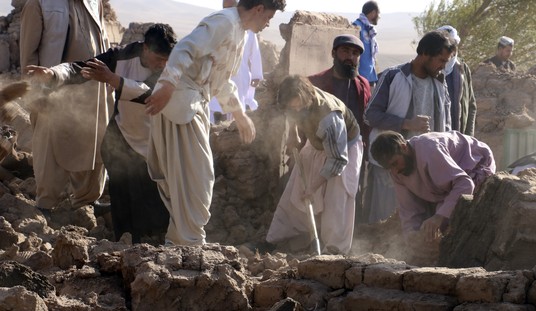Navy divers have begun to find bodies in their search for ten missing sailors after a collision between the USS John S. McCain and an oil tanker two days ago. Pacific Fleet commander Adm. Scott Swift credited Malaysian officials for finding one body, but the others have been found in a compartment within the McCain itself:
Malaysian Navy reports it has found one body, U.S. Navy says; other bodies also found during dive of ship https://t.co/T5uqoA85rO pic.twitter.com/uwwu0UVmPp
— CBS News (@CBSNews) August 22, 2017
The commander of the U.S. Pacific Fleet said some remains of Navy sailors were found in a compartment of the USS John McCain on Tuesday, a day after the warship’s collision with an oil tanker in Southeast Asian waters left 10 sailors missing.
Adm. Scott Swift also said at a news conference in Singapore that Malaysian officials had found one body, which had yet to be identified.
The focus of the search for the missing sailors shifted Tuesday to the damaged destroyer’s flooded compartments. The collision on Monday tore a gaping hole in the McCain’s left rear hull and flooded adjacent compartments including crew berths and machinery and communication rooms. Five sailors were injured.
“The divers were able to locate some remains in those sealed compartments during their search today,” Swift said, adding that it was “premature to say how many and what the status of recovery of those bodies is.”
Like others, Swift wonders whether the proximity in time of two avoidable collisions means something more than coincidence is in play. Swift alluded to two other incidents in the Pacific fleet prior to the USS Fitzgerald collision in June as part of his reasoning to extend the pause ordered by Chief of Naval Operations Admiral John Richardson yesterday:
Swift said he has spoken with the Navy’s most senior surface warfare officer and is looking into the possibility of links between the McCain collision and other mishaps involving Navy ships in the Pacific over the past several months.
“One tragedy like this is one too many,” Swift said. “While each of these four events is unique, they cannot be viewed in isolation. We owe it to sailors and their families to answers the questions that flow from the uncertainty of what happened, how could it happen, and what can be done to prevent such occurrences in the future.”
ABC News recounts the other incidents that went largely unremarked until the two major collisions:
The USS Lake Champlain, a guided missile cruiser, collided with a fishing boat in the Sea of Japan in May. There were no injuries during that incident. The Navy ship tried to alert the fishing boat before the collision, but it was too late.
The USS Antietam, also a guided-missile cruiser, ran aground off the coast of Japan in February, damaging its propellers and spilling oil into the water.
Does the Pacific Fleet have a readiness issue, or is there something going on with its navigation systems? Swift was asked about the possibility of cyberwarfare as a cause for these incidents, said that the investigation was in its “earliest” phase and that nothing would be off the table as a potential contributing factor. Swift said he had not heard or seen any indication yet that cyberwarfare was a factor, but he wasn’t going to rule it out either.
There certainly seems to be a systemic problem with the Pacific Fleet, but four ships out of more than 200 is a pretty small sample with which to reach that conclusion. It could be a coincidence, but at the very least, the Fitzgerald and McCain incidents suggest that the watch procedures might need some updating.








Join the conversation as a VIP Member